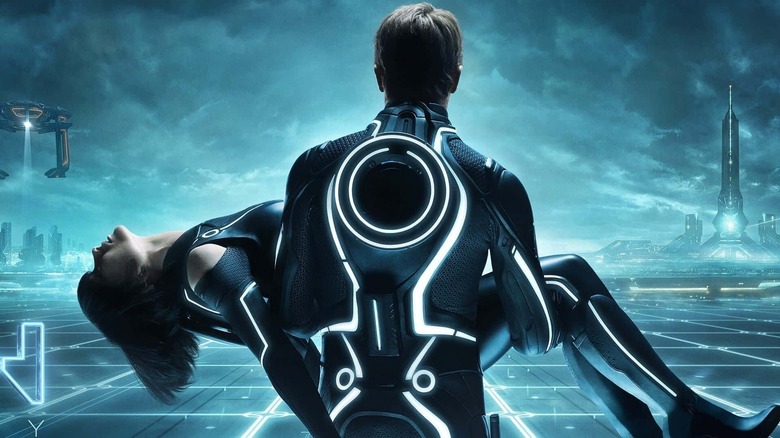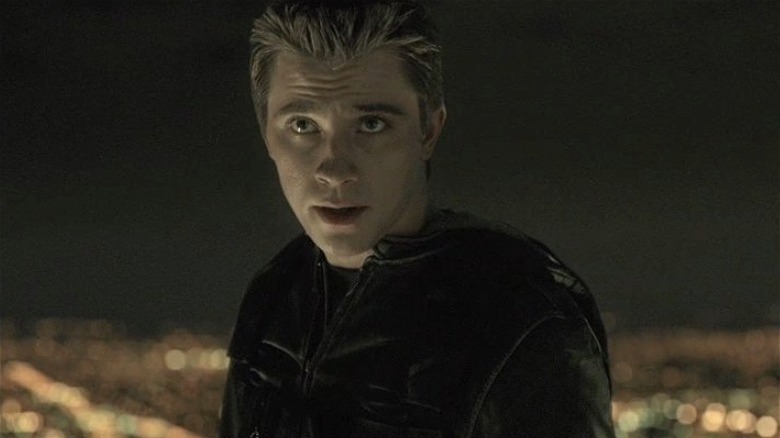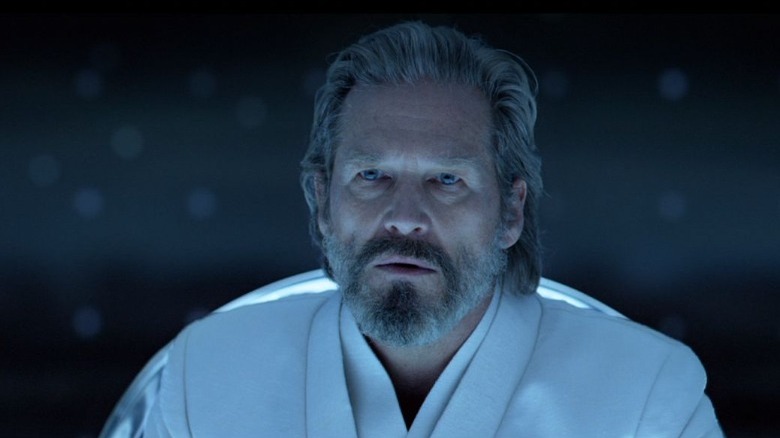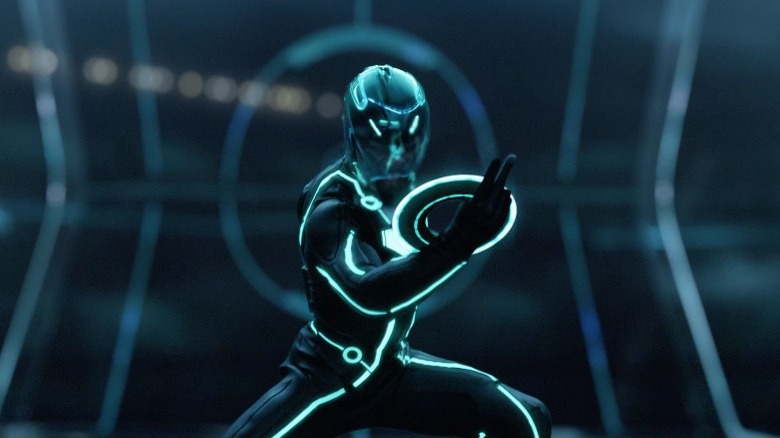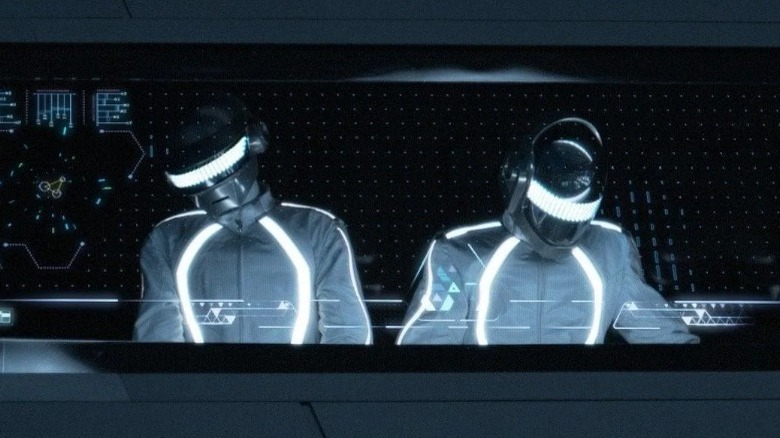Here's Why Tron: Legacy Deserves More Love
In 1982, director Steven Lisberger released "Tron," which featured cutting edge (for the time) computer-generated graphics in a uniquely original futuristic storyline. There are many reasons why "Tron" is still listed as a pioneer in the sci-fi genre; Lisberger's film was truly ahead of its time with its virtual universe setting along with a profound exploration of the creator-creation dynamic. So, when the film's 2010 legacy sequel, "Tron: Legacy" hit theaters, there were massive expectations surrounding the continuation of Kevin Flynn's (Jeff Bridges) gripping saga.
However, "Tron Legacy" still triggers divisive opinions and is considered a critical and commercial flop. Over the years, the legacy (heh) of the sequel has undergone some reappraisal and garnered a cult following that's loyal to director Joseph Kosinski's ambitious vision. I, for one, would like to unfurl a conversation about "Tron: Legacy" and argue that this "Tron" sequel holds more value than initially meets the eye, and should be considered as a distinctive entry in the sci-fi genre.
Although "Tron: Legacy" lacks the never-done-before ingenuity of its predecessor, the sequel expands the world of the original in fun, profound, and aesthetically beautiful ways. Several elements in the film — including the absolutely banging soundtrack by Daft Punk, the compelling characters of Rinzler and Clu, and the plot's complex generational dynamics — contribute to its core appeal. The best part, however, is that "Tron: Legacy" is acutely aware of the kind of film it is. It understands the enduring brilliance of the original and does not take itself too seriously, which grants it an endearing quality in its own right.
Sam's story is rooted in grief (and curiosity)
Minus a terrifying shot of a de-aged Jeff Bridges, the real-world opening sequences of "Tron: Legacy" are the perfect setup for Sam Flynn's (Garrett Hedlund) story. His father's sudden disappearance, coupled with the imposing shadow of Encom's growing monopoly, is enough to push Sam into rebelling against his own legacy. Despite being the largest stockholder at Encom, Sam spends his days living in a roadside garage and pulling annual pranks on Encom. When Sam ventures inside the Grid, viewers are promptly treated to a visual and sonic feast inside a digital frontier meant to reshape the human condition. The Grid lives up to its name, with its warring programs who wield their memory discs during fights in gladiator-styled arenas, with their digital overlord supervising these shenanigans.
It is Sam's curiosity about his father's technological genius, and the need to confront his grief head-on, that spurs him to enter the Grid in the first place. Once there, he is clearly an anomaly, and some of the other programs are instinctively aware of his unique position. The Grid's overlord, Clu (more de-aged Jeff Bridges), has managed to keep other programs under his thumb and alienate them from the concept of their maker to the point that they question the user's very existence.
When Sam announces that he's a user, the crowd's boos die down, as they're struck with questions about their own existence. Clu is understandably agitated by this, as Sam's presence is a threat to his rule and a reminder of his Judas-like betrayal of Kevin Flynn years ago. Unbeknownst to himself, Sam becomes the key to resolving this age-old rift between creator and creation. To accomplish this, he first needs to heal his father wound.
Bio-digital jazz, man
Familial reconciliation is the first step towards growth, but Sam's path is laden with obstacles. Over the years, Kevin has undergone a profound change: from being a practical, shrewd programmer to a "don't mess with my Zen" kinda guy, who finally appreciates the beauty of "bio-digital jazz." Kevin's character transformation is perhaps among the key delights in "Tron: Legacy," and it is clear that Bridges had the creative levity to have fun with the transformed, free-flowing character. In "Tron," Kevin does not give a s*** about his programs, but exits the Grid with his cash — and that's the end of his arc. In "Legacy," Kevin is a changed man, and harbors immense hope due to the presence of Quorra (Olivia Wilde), the last ISO alive.
Speaking of Jeff Bridges supremacy, we need to talk about the film's antagonist, Clu. Clu is a mirror image of Kevin, made to "perfect" the Grid in Kevin's absence. Taking his directive a bit too literally, Clu aims at eliminating his creator, who he deems as "imperfect" and an anomaly, and reprograms Rinzler (Anis Cheurfa) into his primary enforcer. Every scene featuring Clu is a treat, right from his introduction in the arena where he's seen fondling, er, balls, and his entry into the light cycle fight as badass boss music reverberates through the space. Right up till the end, Clu emerges as a compelling villain, and acts as an amplification of Kevin's flaws.
Clu's obsession with perfection comes at a price, and makes Kevin realize his folly; the perfection Kevin was chasing was right in front of him all along: Sam. Although Kevin apologizes to both Sam and Clu, the latter is too far gone, which prompts Kevin to assumes the mantle of a hero and sacrifice himself.
The visual effects are still cool as hell
The visual effects in "Tron" were groundbreaking for a reason, in full display during its disk fight sequences and the light cycle battles. While "Tron: Legacy" follows a similar narrative structure to preserve the basic beats of the original story, the sequel ups the ante in terms of the visual spectacle that are a part of its world. Sam's entry into the arena forces him to participate in disc fights and witness the "derezzing" of programs, which is beautiful to behold. The fight choreography in the Sam vs. Rinzler scene still manages to enthrall, and the multitrack light cycle battle is simply top-tier. Revisit the scene in question here, and please keep in mind that this was created more than 10 years ago!
In terms of overall aesthetics, the Grid's over-the-top neon tints are contrasted with its murky, shadowy roads, which highlights the seedy underbelly of the digital realm. Apart from this, the battery-powered, lit-up costumes in "Legacy" blend in pretty well with the world's gritty, retro-cum-futuristic aesthetics, especially in scenes that are dimly lit. Additionally, the contrast between the orange and blue costumes during high-velocity fight scenes add considerably to the visual and narrative aspects of the film.
In fact, the transformation of Rinzler's suit from a glowing orange to a muted blue cements his arc, as it is indicative of the fact that he fights through Clu's coercive reprogramming and reverts back to his original self, Tron. As the film's namesake, Tron is the connective tissue in the Grid in subtle ways; he is a primary reason behind Clu's emboldened rule over other programs. Apart from this, every Tron sequence is simply sick as heck — plus the man fights with TWO disks. How cool is that?
Daft Punk's killer soundtrack and THAT nightclub scene
Daft Punk ate when it came to creating the soundtrack for "Legacy." Apart from creating the perfect atmospheric mood that complements the vibe of the Grid, the smooth, operative, synth-heavy tracks heighten climatic moments within the narrative. Take the nightclub sequence, where we are introduced to Zuse (Michael Sheen), who is a digital avatar of Ziggy Stardust with a penchant for campy theatrics. As the owner of the End of the Line Club, Zuse knows everything about everyone, and swaggers around with his cane while furthering his devilish motives. Although such unchecked excess should not work in a film about A.I. overreach and creator-creation conflict, for some reason, it absolutely does.
The icing on the cake, apart from Sheen channeling a fun caricature of a futuristic villain, is when Rinzler lands inside the club, and the derezzing starts. The music stops, and the DJ duo, who are, in fact, Daft Punk, pump up the volume and play their track, "Derezzed," to match the carnage. Everything in this scene is pure gold: Rinzler's henchmen unsheathing their orange laser swords and wreaking havoc, a hooded Kevin making a boss entry and destroying everyone in his vicinity, and Zuse vibing to the chaos while screaming "BEHOLD, THE SON OF OUR MAAAKER!" as the music ramps up.
Circling back to Daft Punk's brilliant score, the fact that the "Tron: Legacy" soundtrack is still an inspiration for synthwave, electro-industrial, and techno artists it is a testimony to their talent. There's depth and range in the soundtrack, as the raw emotionality of some scenes are accentuated by moody, operatic sonic landscapes that are prepped among the more upbeat ones. I still play the film's soundtrack to simulate immersion into a fictional world, and I promise, its fun.
